Wuxi Tianyi High School has been awarded first place in the 3rd Annual Dipont Science Olympics. 12 schools and over 100 students across China took part in a 5-month journey into exploration, discovery and the scientific process. The theme was “Science solutions to the world’s problems”.
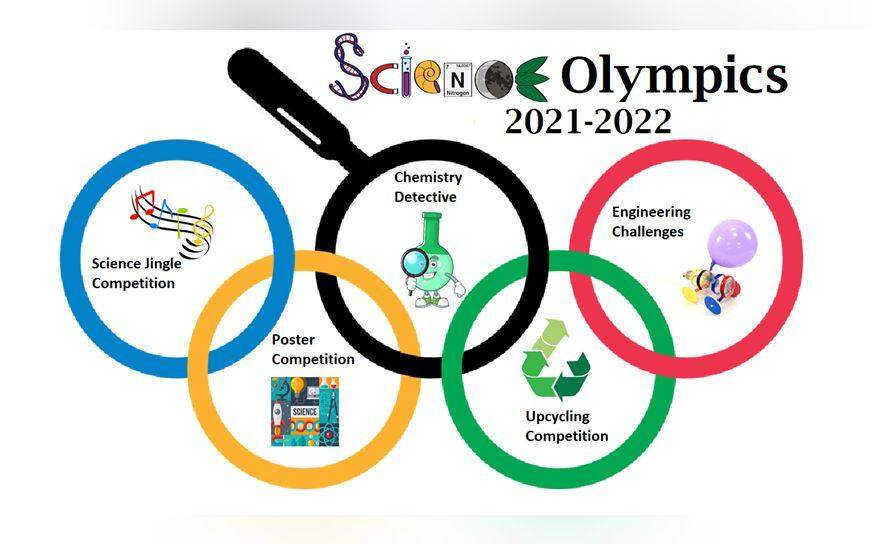 Brenell Ferguson, head of Science in the Dipont High School Programme at Wuxi Tianyi High School, won first prize in the best advisor category. Here she shares her experience of this event, as well as her original inspiration to become a science teacher.
Brenell Ferguson, head of Science in the Dipont High School Programme at Wuxi Tianyi High School, won first prize in the best advisor category. Here she shares her experience of this event, as well as her original inspiration to become a science teacher.
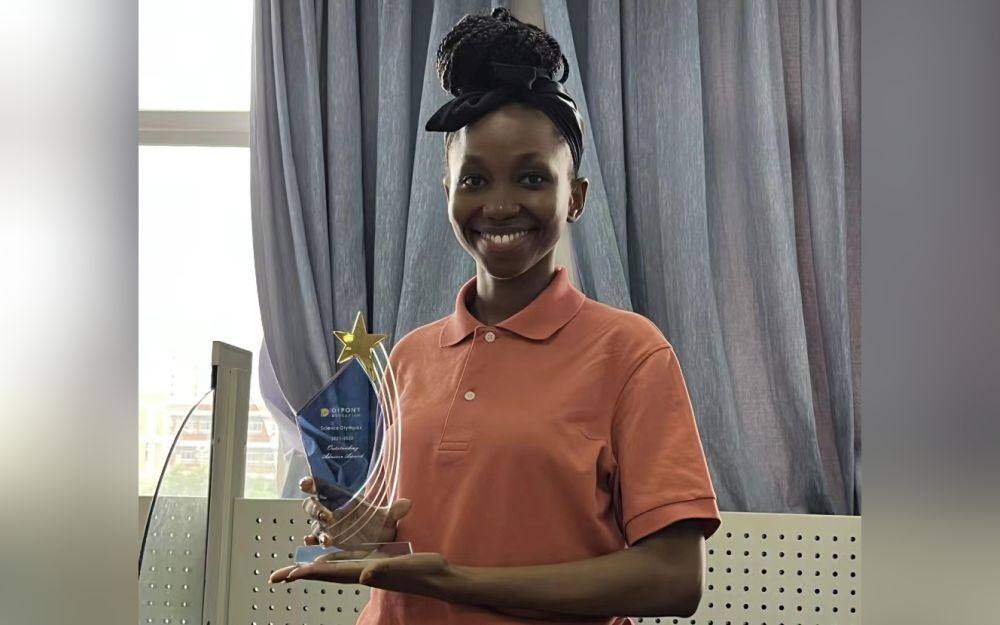
Brenell Ferguson recerntly entered her third academic year as a key member of the Science department at the Dipont High School Programme at Wuxi Tianyi High School.
1. What events are included in the Science Olympics?
The Science Olympics includes different activities that explore a range of science disciplines and approaches. For example, there are the engineering challenges, which were about launching projectiles, or dropping eggs from a great height. There was also an upcycling event, which explored the process of transforming by-products, waste materials, useless, or unwanted products into new materials or products perceived to be of greater quality, such as artistic value or environmental value. Another new category was the Science Jingle, which was a lot of fun too.
2nd Place in the Science Jingle category went to Wuxi Tianyi, represented by Stephanie Zhou, Eazin Xingyue, Esther Tianyu and Henry Xu. Advisor: Brenell Ferguson
The event has grown over the three years. In the first year the focus was just on the poster competition, which challenges students to respond to a real world problem with an informative poster or artistic poster, like a public service announcement. Students need to think about how to express the issue in an efficient and engaging way, and also include potential solutions in this message.
2. How did students go about choosing their poster theme this year?
The science panel first prepared a list of 10 topics related to what’s important in science today. As a designated advisor for the competition I visited every homeroom in my school to introduce the competition and to give examples. At the end of each presentation we would have ten minutes to talk about ideas.
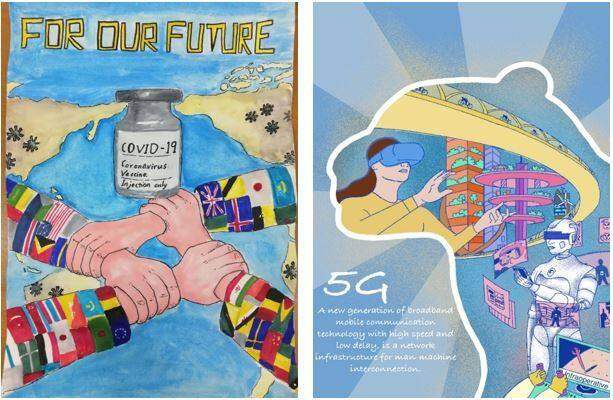
1st Place in the Poster Competition (Artistic Expression Category) went to Frank Fang Chengdu ShiShi; 2nd Place went to Carol Wang, Wuxi No.1 High School
Some students chose to explore AI in the medical field, while others chose to look at electronic currency, and what that could look like in the future. Another hot topic was the environment, looking at what’s happening globally. Vaccines were another topic that got a lot of interest this time around.
3. What was the upcycling competition about?
The idea was for students to take something that is old, and make it new. One of our buildings was getting renovated at the time, so we were able to do a walk around to look for materials that were going to be thrown away.
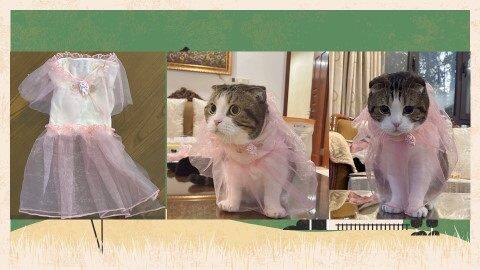
Nancy Pan (Wuxi Tianyi) took out 3rd Place in the Upcycling category for this cat princess dress made from discarded gauze found in a construction site.
I told my students, think outside the box. I don’t care if you want to make a pin with it. It’s your idea. Even if we don’t win, nobody can tell you that your design or your creative idea wasn’t good enough. So what if nobody else sees your vision? If you look at this piece of rock and you believe that you can make it into whatever, so be it. I will help you and we will figure out how to get you there.
4. What was the challenge in the egg drop category?
The egg drop was an engineering challenge. Students had to drop an egg from as high as they could without it breaking. They were given a limited amount of resources and some everyday materials, like some straws, some popsicle sticks, and some string. to do this with.
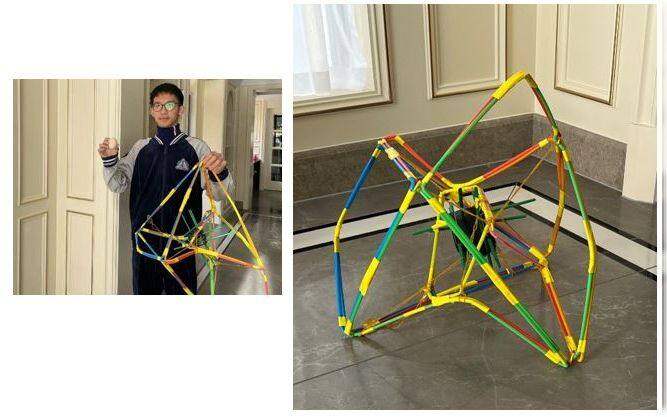
1st place in the Engineering Challenge, Egg Drop category, went to Mycroft Hua from Wuxi Tianyi.
I bought a bunch of eggs to school, and I told my principal in advance that most of these eggs probably wouldn’t survive, and that he might see random eggs falling from the second floor. Students tried out a multitude of ways to make this work, and then we would talk about it. It was fun, but it was also very much a scientific process. Exploring an idea and then testing it. Often failing, but always learning, then cleaning up and trying again.
5. How do you think the Science Olympics benefited your students?
For my students, the biggest benefit is the spirit of inquiry. For any science student, anywhere in the world, the biggest struggle is always how inquisitive are you, and how you’re able to take what you believe, or what you know, or what you see, and actually apply it to something.
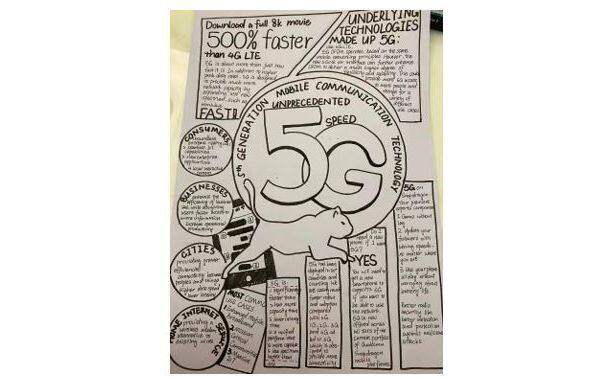
Equal 1st Place in the Poster Competition (Informative Category) awarded to Daisy Wu from Ningbo Zhenhai
Especially with my Grade 10s, this was the first time that had been in an international setting where they needed to be creative and think outside the box. I always tell my students: the point is to have fun. I simply give the topic. It’s up to the students where they want to take that topic. I tell them I could care less if you win, you will still be number one in my eyes.
6. What were some of the comments from your students about the Science Olympics?
Especially with the poster competition, students would come to me and say, I didn’t know that much about this topic. For example, on the topic of vaccines, it’s on the radar now because of Covid, but students became aware of the science and history behind them, and were genuinely amazed.
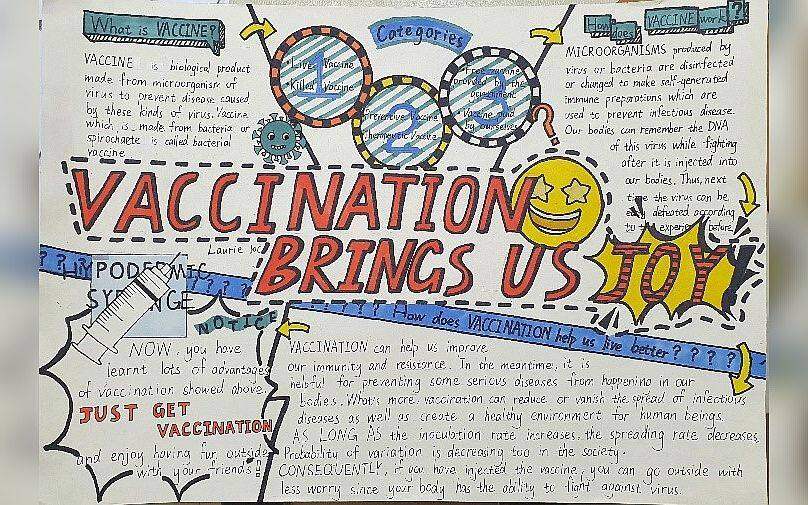
Equal 1st Place in the Poster Competition (Informative Category) awarded to Laurie Song from Nanjing FLS.
Many of the students experienced that Aha! moment as a result of their independent research about a topic. As a teacher, and as their advisor, that was really satisfying to be a part of, especially as it reminded me of my own experience when I was a student, just realizing the incredible potential in science.
7. What did you enjoy the most personally about the Science Olympics?
My first grade teacher, Mrs. Ferguson, has been a life-long inspiration for me. It’s largely thanks to her that my career now is in science education. She did what I think, unfortunately, many primary teachers do not do. She allowed her students to explore. I did not fall into science education. It was a path I was inspired to take by educational experiences I was fortunate to receive.
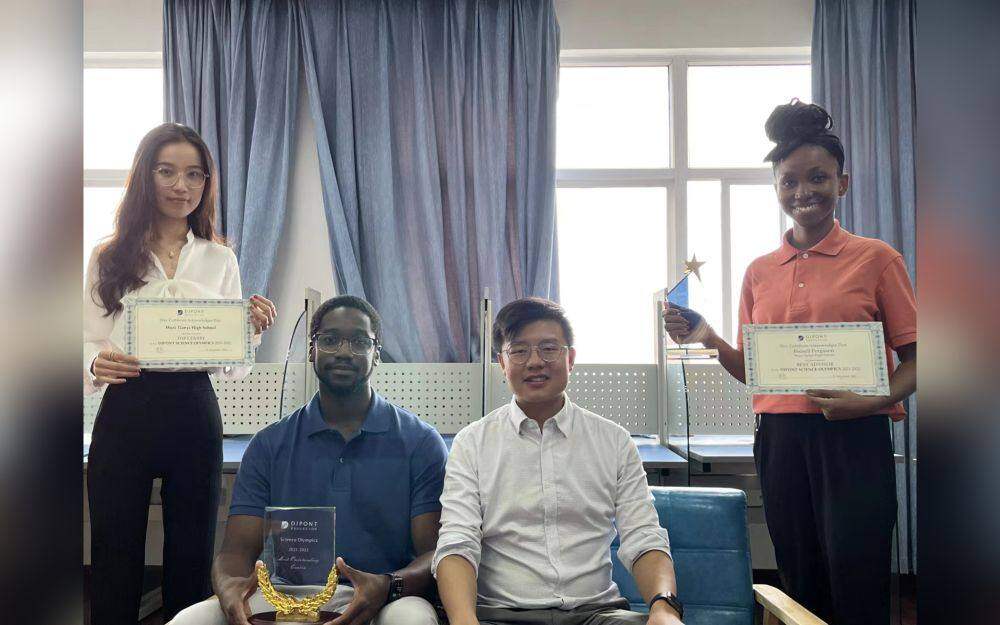
Amber Zhng, Davario Saunders, Justin Linfeng and Brenell Ferguson make up the Science team in the Dipont High School Programme at Wuxi Tianyi High School.
Seeing the love that these students get for the scientific process has been my biggest reward. I’m a female in STEM. There are not many of us. One of the first things I say when I step into my classroom is: anybody can do science, look at me. Anybody can do it. It’s about your ability to remain steadfast on your journey.
When you see the accomplishments of the students, and when their faces light up in the realization of that, it’s a proud moment for a teacher. That is when you can say to your students: You have everything it takes to be anything that you want. Who knows? You might be the person to cure cancer one day. The possibilities are endless.
- Please note that the images selected to accompany this article are just a small representation of the tremendous work produces by participants in the 3rd Annual Dipont Science Olympics.

